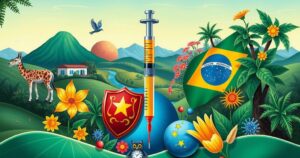Returning Home: Displaced Families in DRC Confront Hunger and Devastation

Linda L. and many others in northeastern DRC are grappling with the aftermath of displacement due to conflict, facing overwhelming hunger and destruction. Over five million people are affected, with acute food insecurity on the rise. The World Food Programme aims to aid millions but faces significant funding shortfalls. The need for support is urgent as families work to rebuild their lives amidst ongoing challenges.
Linda L. has returned to her native village of Bweremana in North Kivu province, but the conditions are dire. The land is overrun with weeds, houses are damaged, and her possessions have been looted amid ongoing conflicts in northeastern Democratic Republic of the Congo (DRC). After receiving food aid from the World Food Programme (WFP), she remarked, “I have to start again,” highlighting the enormous needs faced by her family and others like her.
Over five million individuals have been displaced in the conflict-stricken northeast DRC, with many internally displaced persons (IDPs) returning home to devastated communities. As they navigate the destruction of homes and livelihoods, the ongoing conflict continues to impede recovery efforts and exacerbate food insecurity. A recent hunger study indicates that over 10 million people in eastern DRC are currently facing severe food shortages, significantly increasing from previous estimates.
Eric Perdison, WFP’s Regional Director for Southern Africa, indicated, “The humanitarian situation in the DRC is deteriorating at an alarming rate.” Families previously struggling with hunger are now facing even harsher circumstances as a result of ongoing violence and economic instability, emphasizing the urgency of humanitarian support.
The WFP initiative aims to assist 6.4 million people this year, yet faces a funding shortfall of US$399 million over the next six months. Despite these challenges, WFP has reached over 700,000 individuals with urgent food assistance thus far. Perdison expressed a commitment to enhance support but emphasized the necessity for additional resources.
The escalating crisis in DRC reflects the interplay of conflict, economic decline, and surging food prices which have risen by nearly 40 percent. For families like Linda’s, WFP support proves vital in temporarily alleviating their hunger while they await their upcoming harvests, as she stated, “This is helping us combat hunger, while we wait for our harvests from farming.”
After fleeing violence near Bweremana, Linda’s family lost all their possessions and had to rely completely on WFP food assistance in Goma. Now, back home, she faces the difficult task of rebuilding from scratch, as her house is stripped bare of necessities. She expressed her struggle to reestablish her family, saying, “I’m struggling to resettle, because there are many things lacking.”
Efforts are underway to assist those returning to North and South Kivu provinces, where families are piecing together their lives amidst devastation. Wilfred Nkwambi, head of the WFP Goma office, stated, “Our focus right now is to reach those most in need,” while acknowledging the complex security challenges posed by numerous armed groups in the region.
In the town of Sake, another displaced woman, Safi, faces similar hardships as she attempts to rebuild her life after her husband went missing in action. With her home destroyed, she now lives with her mother and works as a roadside hairdresser, relying on WFP assistance to alleviate her family’s hunger. “WFP food assistance is vital to us as displaced people,” she noted, emphasizing the necessity of external support in her circumstances.
The response to the ongoing crisis in eastern DRC is bolstered by donors from multiple nations and organizations, including Belgium, Canada, and the United States, which contribute essential funding to the WFP’s humanitarian efforts.
The humanitarian crisis in the Democratic Republic of the Congo reveals the profound challenges faced by millions displaced by ongoing conflict and deteriorating living conditions. The support from the World Food Programme is critical for those affected, as seen in the experiences of individuals such as Linda L. and Safi. Without increased funding and a more secure environment, the pathway to recovery is fraught with difficulties. The situation requires urgent attention and sustained humanitarian efforts from the international community to alleviate suffering and provide necessary resources for rebuilding lives.
Original Source: www.wfp.org








